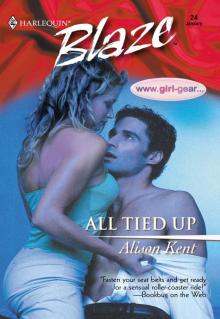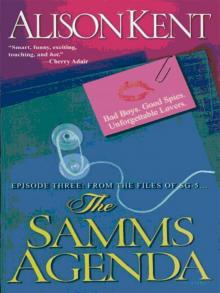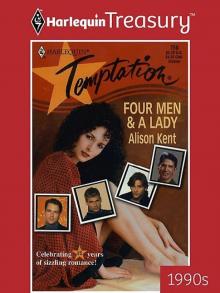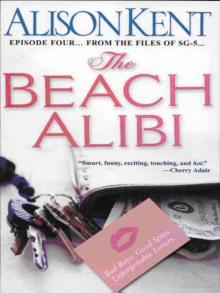- Home
- Alison Kent
Hope for the Holidays: a Christmas novella (A Hope Springs Novel Book 6) Page 3
Hope for the Holidays: a Christmas novella (A Hope Springs Novel Book 6) Read online
Page 3
Cilla found his address on her own and pulled into the driveway, parking near the walkway that led to the front steps. She opened her door before he could get out of the car. Maybe he’d offended her earlier when offering help. He didn’t think he had but he kept his distance.
He didn’t know what she’d been through since graduation, but something had happened to send her back to Hope Springs. It wasn’t just about drowning her sorrows in chocolate and vanilla buttercream. She was about to have a kid. And as far as what he’d learned today, she was on her own.
Then again, the fact that she hadn’t mentioned her parents or her baby’s father and his folks didn’t mean they weren’t involved in her life. Which left him wondering what she was up against.
Cilla had never been flighty. Bubbly and outgoing, sure, but headstrong, too. The poster child for the girl most likely to do everything right. He wondered what had gone so wrong that staying here with him had become her best option.
Because him being anyone’s best option...
Man, he really needed to stop thinking that way because no matter his response to Cilla about his very minor fame, he’d earned it. He wasn’t embarrassed by it. It was just hard at times to believe his life had turned out to include all the things he’d ever loved.
Almost all of them anyway.
He shook off the thought as they climbed to the porch, belatedly asking, “Do you have a bag?”
“It’s in the trunk.” She waved a hand toward the car. “But can we go in? I really need to use the restroom.”
“Sure.” He pushed open the unlocked door, stepping back to let her go first, only to be rocked by the sound of her laughter. He swore his face colored. “Guess that’s my Hope Springs showing.”
“It’s adorable and I love the sense of security, but can you point me...”
“Right,” he said, gesturing. “The hall there. To the left. Second door.”
“Thanks,” she said, dropping her purse on the floral sofa and hurrying away.
Pushing at his glasses, Cary stared at the fabric that was a vintage print, a cream background with sprays of pink roses in fanned greenery. The cushion on the right was worn bald. His mother’s seat. It was closest to his father’s lounger and both faced the TV. His mother had sat and read while his father had flipped through the twenty-four-hour news channels.
He couldn’t remember them having a single meaningful conversation, but in those days he’d only seen what they’d wanted him to see. And it was too late to learn more about who they’d been. Then again, their kicking him out had shown him enough.
He looked back to Cilla’s handbag. It was leather and the color of Tabby Danger’s trench coat, a deep autumn burnt orange to go with her eyes. Tabby’s, not Cilla’s. He imagined it cost more than the sofa had when it was new, and he wondered again what had brought her back to Hope Springs.
She’d seemed so out of place when she’d lived here. So much bigger and brighter than fit the small town. Yet he could totally see her living here now. Some of that, he supposed, had to do with how much the place had changed.
But part of it, he admitted, was because he was seeing things through the eyes of an adult and not a kid willing to do anything to escape. Funny how that anything had come in the form of Cilla’s razor blade.
“Uh, Cary?”
He looked up to see Cilla standing in his studio’s open door. “Yeah?”
“You sure you don’t work for the NSA?”
He watched as she took in his equipment. The monitors alone were impressive, but he was an unyielding tyrant about backing up to his own servers as well as storing his work in the cloud.
Lights blinked and flickered from every corner of the room, a red, blue, and amber show of twinkle and flash. Then there were his art supplies, both digital and mixed media, and all the tech used for his animation.
On either side of the doorway, on walls Cilla couldn’t see from where she stood, hung framed covers of every issue of The Adventures of Tabby Danger. He liked seeing them when he left the room. He liked being reminded of his purpose-driven work that felt like play.
Of the joy he brought kids who read for pleasure.
Of the hope he brought others who had none.
They were the ones who stuck with him, the ones who looked beyond Tabby’s capers, who followed her journey to overcome a past spent abandoned in shelters and bullied by toms.
If he offered one kid a reason not to give up, to endure neglect or worse, survive abuse, then the realism he’d drawn on for his fiction would be worth revisiting his own ugly past.
Cilla turned to him then without entering the room. “You really shouldn’t leave this place unlocked, Cary.”
“I guess not.”
“This setup must be worth a small fortune.”
He could see where this was going and deservedly so. “It is, yeah.”
“I mean insurance will obviously replace the equipment in case of a fire or theft but you’re risking your intellectual property...” She let the sentence trail, shaking her head wryly. “I’m sorry. I’m butting in where I have no business—”
“It’s fine.” He shrugged and shoved his hands into his pockets. “Don’t worry about it. I have multiple backups, but I’ll start locking the doors. You’re right.”
“It would make me feel better if you did. Not because I’m here,” she hurried to add, “but I’d hate for you to lose anything.”
He took her at her word because he had no reason not to. Besides, it meant a lot that she cared. “I’ll just need to remember my key when I go out. And find one for you.”
“Thank you,” she said and looked back at the room. “This really is amazing. I always pictured you hunched over a table with brushes and bottles of ink and colored pencils.”
“Not for a lot of years,” he said, wondering why she’d ever pictured him drawing. Wondering why she’d held on to the memory. Wondering most of all why the idea had his heart racing.
“Did you get a degree in art?” she asked, finally turning toward the main room, slipping off her sweater and draping it next to her purse.
She’d taken it off while they’d eaten but only after they’d settled into their chairs. And she’d tugged it back on before standing. With the bulky garment out of the way, he could see how far along she was.
She was huge. Even larger than he’d realized when he’d first seen her on Fourth Street.
“When are you due?” Crap. “I’m sorry. That’s not what I meant to say.”
A nervous smile played across her lips as her hand settled protectively on her bulk. “Are you sure?”
To cover his gaffe, he went back to what she’d asked. “I never got a degree. I never went to college.”
“Really? I thought you of all people...” Frowning as if unsure about going on, she paused, then rushed forward with, “I’m due on Christmas Day.”
Her due date was suddenly the last thing in the world he cared about. “What do you mean, me of all people?”
“C’mon, Cary,” she said, crossing her arms beneath her breasts and above her belly as she moved to put the sofa between them. “Everyone knew how brilliant you were. How brilliant you are. How talented,” she added, and he huffed in response. “It’s true. We all did.”
He didn’t buy her insistence. “News to me.”
“Well, you were rather... unapproachable,” she said archly. “But believe me when I say that most of us thought you should be going to Rutgers or Bard or MIT. Their art programs are amazing.”
“MIT costs money,” he said, stopping short of asking who she meant by most of us. And why any of them thought about him at all. “And I didn’t have the grades for a free ride. Or, you know, a diploma.”
He would kick himself forever for that, because a stellar GPA wouldn’t have been that hard to earn if he’d returned the next year to graduate. He’d just been more interested in getting out than where he’d end up after leaving.
“I suppose a degree wo
uld’ve been a waste of your time,” Cilla said into his musings. “You seem to have done well for yourself without one.”
“It would’ve cut down on the trial and error,” he said with a shrug. It was easier than going into all the things he’d done wrong before finding his calling with Tabby Danger.
“Was there a lot of that?” She reached for her sweater then left it on the back of the couch, tracing a rib of cable-knit with one finger. “On your way to being a celebrity?”
“Some, sure,” he said, her earlier words still echoing through him. “But probably no more than any teenager trying to find himself. And then I wasn’t a teenager anymore.”
Another moment passed, and she picked up her sweater, her voice soft as she asked, “Why didn’t you say anything? You didn’t tell anyone you were leaving or where you were going. You didn’t even say goodbye.”
He thought about rushing out with the truth, telling her now what he’d wanted to tell her then, but he bit back the words and said simply, “I didn’t have a reason to stay.”
It was a truthful response and yet it didn’t answer all of what she’d asked. The time for that admission had passed, and yet... She held his gaze, her expression telling him everything he needed to know: she’d been fully aware of the life he’d lived in this house.
Well, crap.
He glanced at the floor, rocked back on his heels, finally looked up again, and, one more time, locked the past away. “You think maybe it would be easier if you took my bedroom down here? I can move upstairs.”
“I’m pregnant, Cary,” she said, her eyes misty, her smile tremulous but true. “I’m not an invalid. I’ll be fine.”
“Are you sure?”
“I’m sure.”
She didn’t sound sure about anything. And the only response he could think to make was, “So, I should get your bag then?”
Chapter Four
CILLA WANDERED THE first floor while Cary fetched her things from the rental car. She needed to turn it in as soon as possible. She was here now and had a convenient place to stay. She could walk anywhere needed to go and lose the unnecessary expense.
The inheritance from her grandmother had been earmarked for Reddy’s Threads since Cilla’s days of dreaming and designing and imagining. The money had come into her possession eight years ago when she’d turned twenty-five.
She hadn’t touched a cent.
She did need to find a new obstetrician. A pediatrician, too. That was item number one on her list. Actually, aside from everything related to the shop and a permanent place to live, that was her list, getting set up for her and her child’s new life.
She wondered if she and the baby could keep renting from Cary. Or if doing so would be a bad idea. It was a bird-in-the-hand thought. Staying here would be one more item she could mark as done. But being an easy solution didn’t make it the best.
She and Cary hadn’t even talked about money to cover her stay. What length of time would be convenient for him. How much to add for groceries. If they would each do their own cooking and cleaning or share those chores. They hadn’t talked about much at all.
What they’d done was engage in mundane conversation, skipping across the surface of the past. Not surprising, Cary seemed as good at doing that as she was.
What a sad thing to have in common.
“I’ll just carry these up then?”
At Cary’s question, she glanced over. Lost in thought, she hadn’t heard him return. He stood just inside the front door, a suitcase in each hand and her duffel slung like a messenger bag across his body. She knew how much the items weighed.
“Here, let me help,” she said, circling the couch.
He shook his head, his dark blond hair falling low on his brow, and made for the staircase. “I’ve got it.”
She followed, suddenly determined to have some of this conversation now rather than later. Going into these final days of her pregnancy required a better handle on her situation than she’d had when getting on the plane before dawn this morning.
Had it only been this morning that she’d flown out of JFK? It already seemed ages ago, she mused, trudging up the stairs then down the hallway to the bedroom Cary said was the largest and the only one suitably furnished. Though his idea of suitably...
She felt as if she were crossing the threshold into the years they’d spent in high school. The bed was a twin covered in a thin plaid comforter. A braided throw rug in the same muddy red and blue hid a small circle of the floor’s faded hardwood.
An easel sat in one corner, bare of a canvas or paints. The chest of drawers and bookshelf were made of the same scarred maple as the bed frame, the shelf stuffed with comic books and paperbacks; most appeared to be science fiction.
“Was this your room when you lived here?” She wasn’t sure why she’d asked. The answer was obvious. “I mean, you live here now but this was your room before, right?”
Cary nodded, setting her duffel on the bed and the two bags in front of the chest. “I took the master bedroom when I moved back since it was closest to the dining room.”
When he moved back. After his father had died. “And that’s your studio now.”
He nodded again. “I’ve made a lot of changes to those rooms...”
He let the sentence trail, leaving her to wonder what he’d kept to himself. She didn’t press except to say, “But you haven’t done anything about the rest of the house.”
“I’ve been thinking about it. Opening up the first floor. Getting rid of the furniture. I thought about it again earlier,” he said, his face coloring though after a short pause he went on to add, “when you set your purse on the couch.”
What a strange observation. “Why’s that?”
“I don’t know.” He moved to the window and pushed aside the pinstriped curtain to stare out. “Maybe the past and the present colliding.”
She’d been expecting something... not quite so deep. But she wasn’t about to waste the opening. “You don’t like to see that happen?”
He didn’t answer right away so she crossed the room to stand beside him, looking out at the view, wondering what he saw, if anything, or if he was lost in thought and aware of nothing at all.
What she saw was a landscape of housetops covered with dead leaves and pine brush, the canopy of bare branches like a skeleton army’s bayonets angled here and there. Her room in her childhood home had faced a similar scene.
She remembered how quickly in the spring the trees budded, leaves opening almost overnight into a sea of green. She wondered if Cary had ever shinnied down the oak outside, if it had been strong enough to hold his weight, if he’d ever thought of not climbing back up, not coming home—
“I like everything in its place. The past in the past. The now in the moment.” He shrugged as if unsure he was making sense. “I’m not attached to anything here in the house. I’ve just been lazy about getting rid of things. Replacing them.”
“Then don’t. Unless you don’t like the furnishings.”
“It’s more that they’re falling apart. And they smell like... I don’t know. Like when I lived here before and that’s not my life anymore.” He let the curtain fall; the floor creaked as he moved to sit on the edge of the mattress where he picked at a snag on the spread. “I should’ve gotten rid of everything after my father’s funeral. I just have a hard time with change I guess.”
Now this was interesting. And possibly problematic. She moved to stand in front of him. “You know I’m about to have a baby.”
He looked up, a crooked grin on his face. “That’s pretty obvious.”
“You said I could stay here as long as I like. But the baby means change. A big one.”
“I know.”
“Does that mean you’re okay with me having her here? Not giving birth here,” she hurried to add when his face blanched, “but staying here after she’s born? Until I can find something suitable. I’m not going to be a freeloader. I have money to contribute to the household, for re
nt, utilities, food. Which we haven’t talked about. So maybe we should get some of those specifics settled? House rules and all that?”
He held her gaze, saying nothing as if he was waiting for her words to settle. Or was turning them over, front to back, side to side, trying to fit them together in a way that made sense.
She thought she’d been pretty clear and hated to push for a response. But the longer he took to answer, the more awkward the silence grew. The air in the room tightened, humming like harp strings taut and ready to snap.
Finally, he cleared his throat. “It’s... she’s a girl then? The baby?”
Rubbing her hands over the gooseflesh on her arms, she nodded. Then she came to sit beside him, lowering herself as gracefully as her unwieldiness allowed. “She’s a girl.”
He leaned forward, elbows on his knees, hands clasped between. “That’s good.”
She didn’t know why and, at the moment, didn’t want to ask. “About the rent—”
“I’m a friend doing a favor for a friend, Cilla,” he said with a quick glance in her direction before returning his gaze to the floor. “Rent’s not necessary.”
“It is necessary. I’ll be taking up space, using hot water, electricity.” She smoothed the surface of the covers at her side, the same spot he’d mussed and wrinkled. “I don’t want to put you out. I would love to stay here as long as you’ll have me but if it’s inconvenient or you’re uncomfortable with the idea of a baby in the house, it would be better if I knew now so I can make arrangements.”
“You can stay. For as long as you need to. Both of you. It’s fine.”
She took a deep breath, blowing out the anxiety fluttering in her chest. “A few weeks. A couple of months. That should be it. A baby is going to disrupt your schedule and the peace and quiet you’re used to. I can’t ask that of you long-term. But I do think we need to settle everything before I unpack.”
“Sure,” he said, getting to his feet and crossing the room to the door. He turned to face her, his hands in his pockets as he leaned a shoulder against the jamb. “We can talk about house rules. Or we can talk about what you’re doing here.”

 Beneath the Patchwork Moon (A Hope Springs Novel Book 2)
Beneath the Patchwork Moon (A Hope Springs Novel Book 2) The Second Chance Café (A Hope Springs Novel Book 1)
The Second Chance Café (A Hope Springs Novel Book 1) The Sweetness of Honey (A Hope Springs Novel Book 3)
The Sweetness of Honey (A Hope Springs Novel Book 3) The You I've Come To Know (A Mother's Love Book 1)
The You I've Come To Know (A Mother's Love Book 1) The You I'll Love Forever
The You I'll Love Forever Abbot
Abbot The You I Want For Life (A Mother's Love Book 2)
The You I Want For Life (A Mother's Love Book 2) The You I've Come to Know
The You I've Come to Know The Comfort of Favorite Things (A Hope Springs Novel Book 5)
The Comfort of Favorite Things (A Hope Springs Novel Book 5) The You I Want for Life
The You I Want for Life Hope for the Holidays: a Christmas novella (A Hope Springs Novel Book 6)
Hope for the Holidays: a Christmas novella (A Hope Springs Novel Book 6) Bliss and the Art of Forever (A Hope Springs Novel Book 4)
Bliss and the Art of Forever (A Hope Springs Novel Book 4) Play Me (Barnes Brothers Book 2)
Play Me (Barnes Brothers Book 2) No Limits
No Limits Love in Bloom
Love in Bloom All Tied Up
All Tied Up The Samms Agenda
The Samms Agenda The Second Chance Café
The Second Chance Café One-Click Buy: March 2009 Harlequin Blaze
One-Click Buy: March 2009 Harlequin Blaze BOUND TO HAPPEN
BOUND TO HAPPEN The Sweetest Taboo
The Sweetest Taboo The Second Chance Café (A Hope Springs Novel)
The Second Chance Café (A Hope Springs Novel) Undeniable
Undeniable Striptease
Striptease The Bane Affair
The Bane Affair At His Mercy
At His Mercy Four Men & A Lady
Four Men & A Lady The Comfort of Favorite Things (A Hope Springs Novel)
The Comfort of Favorite Things (A Hope Springs Novel) Unforgettable (The Dalton Gang #3)
Unforgettable (The Dalton Gang #3) Goes down easy: Roped into romance
Goes down easy: Roped into romance Holiday Kisses: A Rare GiftMistletoe and MargaritasIt's Not Christmas Without YouThis Time Next Year
Holiday Kisses: A Rare GiftMistletoe and MargaritasIt's Not Christmas Without YouThis Time Next Year No strings attached
No strings attached Playing Love's Odds (A Classic Sexy Romantic Suspense)
Playing Love's Odds (A Classic Sexy Romantic Suspense) Unbreakable
Unbreakable Red Hot Holiday Bundle
Red Hot Holiday Bundle Kiss & Makeup
Kiss & Makeup The Shaughnessey Accord
The Shaughnessey Accord Larger Than Life
Larger Than Life Call Me: sold live on CBS 48 Hours (Barnes Brothers Book 1)
Call Me: sold live on CBS 48 Hours (Barnes Brothers Book 1) With Extreme Pleasure
With Extreme Pleasure The Beach Alibi
The Beach Alibi Indiscreet
Indiscreet The Sweetness of Honey (A Hope Springs Novel)
The Sweetness of Honey (A Hope Springs Novel) Maximum Exposure
Maximum Exposure